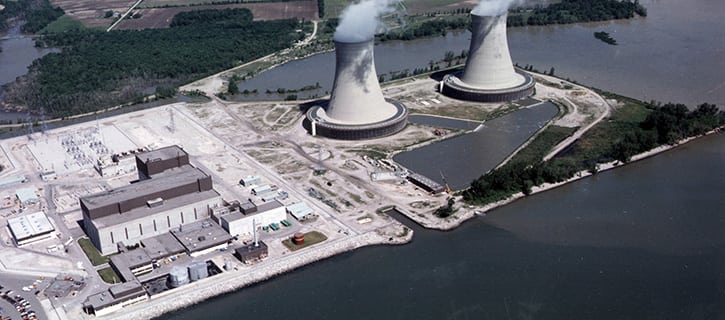DTE Energy’s Fermi 2 Nuclear Reactor Gets License to Operate for 20 More Years
Fermi 2, a 1,170-MW boiling water reactor owned by DTE Electric on the western shore of Lake Erie, in Monroe County, Mich., has garnered the Nuclear Regulatory Commission’s (NRC’s) green light to operate until March 2045.
DTE Electric submitted an application to the NRC to renew the 29-year-old reactor’s operating license in April 2014. The original operating license for the reactor would have expired in March 2025.

Fermi 2, which is run by about 800 full-time workers, has produced more than 200 million MWh during its lifetime. The single-cycle, forced circulation GE-BWR 4 first got its operating license in March 1985. Fermi 1, a sodium-cooled fast breeder reactor that was located nearby, has been decommissioned.
DTE Energy said in a statement that it spent two years developing “exhaustive technical and environmental studies” prior to the filing.
The NRC said it authorized the director of the Office of Nuclear Reactor Regulation to issue the renewed license despite a motion filed by anti-nuclear groups to reopen the adjudicatory hearing, which is pending before the NRC’s Atomic Safety and Licensing Board. “The Commission’s direction does not reflect judgment on that motion or a proposed new contention challenging the renewal,” the NRC said.
To date, the NRC has renewed the operating licenses of 87 commercial nuclear power reactors, though three of these have since permanently shut down. The NRC noted that applications for an additional eight renewals are currently under review: Indian Point 2 and 3 (filed in April 2007); Diablo Canyon 1 and 2 (filed in November 2009); Seabrook 1 (filed in June 2010); South Texas Project 1 and 2 (filed in October 2010); and Waterford 3 (filed in March 2016).
However, Pacific Gas and Electric, which owns the Diablo Canyon plant on the central California coastline, plans to permanently close the 2.3-GW reactor by 2025.
The NRC is meanwhile scheduled to issue a final second supplement to the final environmental impact statement for Indian Point by January 2017. The current operating licenses for Units 2 and 3 were set to expire in September 2013 and December 2015. The reactors continue to operate under “timely renewal,” which allows them to operate under existing licenses until the NRC makes a final determination on the license renewal application.
—Sonal Patel, associate editor (@POWERmagazine, @sonalcpatel)